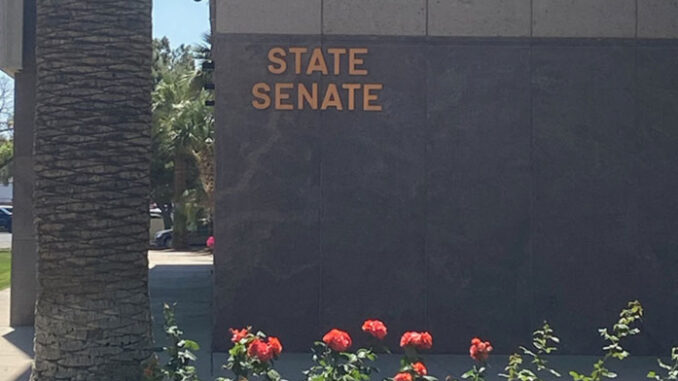
by Corinne Murdock | Jan 31, 2022 | Education, News
By Corinne Murdock |
Pastor Drew Anderson called for the Arizona Board of Education to revoke the teaching license of controversial elementary school teacher and prominent Red for Ed, Save Our Schools activist Wes Oswald. As AZ Free News reported, Oswald posted a video of himself cutting up a national school choice scarf as a “really fun craft” in honor of National School Choice Week. Anderson — lead pastor of Legacy Christian Center, chaplain of the NFL Alumni Association, and former NFL player — appeared on the Conservative Circus radio show on Monday to discuss his petition against Oswald.
Anderson’s perspective on the issue wasn’t borne out of mere opinion. The pastor explained in an Arizona Daily Independent opinion piece that he was one of the lucky few that benefited from school choice. Anderson recounted that the opportunity likely saved his life.
“Growing up, I had to attend the same K-8 government assigned schools that the rest of the black kids in my neighborhood had to go to and it was challenging to say the least. Many kids did not see graduation day and my five closest friends were either in prison or dead by the time we were 18 years old. Fortunately for me though, I was able to escape those schools and by the grace of God was able to attend an outstanding private Catholic school which led to me graduating high school, going to college on a scholarship, and ultimately living my dream and playing in the NFL,” said Anderson. “Today I am a pastor and not only do I fight to win souls for Jesus, but I also fight for children, especially minority kids, to have the same opportunity I did growing up and attend the right school to help them achieve their goals in life like I did.”
In a follow-up with Conservative Circus host James T. Harris, Anderson asserted that school choice is the key to achieving equal opportunity. He lambasted Oswald for calling himself a champion for children’s needs while opposing school choice.
HEAR PASTOR DREW ANDERSON DISCUSS SCHOOL CHOICE
“Next to anything in this modern-day era, school choice is the only way that inner city kids right now are having an opportunity to even remotely catch up or get up out of the poverty situation that they’re living in. So to see somebody that calls themselves an educator be so heinous to me is one of the most appalling things I’ve ever seen,” said Anderson. “How do you call yourself a champion for kids and you’re discriminating against kids based on your own opinion, which to me is crazy.”
In response, Harris opined that the destruction of an image of hope for so many children, especially those of color, was especially appalling.
“I think it’s a powerful image of why parents should be pulling their kids out of government-run schools or at least have the choice to put them where they want to,” said Harris.
On the topic of current teacher’s unions, Anderson added that removing choice from education could be likened to a modern-day slavery: an “educational slavery” that he asserted lends to the school-to-prison pipeline. The pastor insisted that the state could reduce the more than $30,000 it spends on prisoners by investing in the $15,000 he asserts it would cost to give students school choice.
“Back in the day, there was a union that fought hard to keep slavery because slavery was so productive for the people in the South, and right now, James T., we have what I call ‘educational slavery’ and we need to abolish educational slavery. Educational slavery is what’s funding all these private prisons, because there’s this thing called the ‘public school to prison pipeline’ that nobody wants to talk about,” said Anderson. “If I can chain you up to a public school that’s failing and a public school that’s in a bad area, then eventually I can chain you up to a wall in a prison and have you working for thirty cents a day instead of being a productive, tax-paying citizen. It’s time for us to start properly incarcerating people and it’s time for us to properly educate people. And the way you properly educate people is to give them a choice to pick whatever school’s best for them.”
Anderson noted that he’s praying for individuals like Oswald that are against school choice.
“I pray for them because most of them have no idea of what they’re even talking about because none of them are black, first of all. None of them are from the inner city, second of all. And none of them, when they say ‘save our schools,’ none of them are talking about saving our schools that over 79 percent of most minorities have voted to say that they do want school choice,” said Anderson. “I’m not against public schools at all. But what I am against is hindering people from picking what education works best for them. I’m praying for people like that because the ignorance that they spew and the ignorant view that they hold, they’re hindering kids from being properly educated.”
Corinne Murdock is a reporter for AZ Free News. Follow her latest on Twitter, or email tips to corinne@azfreenews.com.

by Terri Jo Neff | Jan 31, 2022 | News
By Terri Jo Neff |
History was made at Barrett-Jackson in Scottsdale last week when a record $3.6 million was bid for a 2023 Chevrolet Corvette Z06, VIN 001, during a multi-day charity event celebrating the 50th anniversary of Barrett-Jackson.
The high bid for the coveted first retail production of the 70th Anniversary Corvette model came from Michelle Mauzy, who donated an additional $100,000. All proceeds from the sale went directly to Operation Homefront.
Overall, more than $8.8 million was raised for charity from the sale of 10 vehicles during the event, pushing the company’s all-time charity total to over $144 million.
Several other highly-prized vehicles were auctioned off, include a custom 2022 Karma GS-6 “Mr. 305 Edition” owned by Grammy Award-winning artist Pitbull, who attended the event Saturday night as his vehicle was sold. The Karma sold for $500,000, with another $200,000 donated, all earmarked for Selfless Love Foundation and The SLAM Foundation.
“Raising over $8.8 million for charity this weekend was the perfect way to honor our 50th Anniversary,” said Craig Jackson, chairman and CEO of Barrett-Jackson. “It was an absolute honor to share our auction block with some of the world’s most influential artists and business leaders, including Pitbull, Bret Michaels and Henry Ford III to raise both funds and awareness for many worthy causes.
Jackson added that giving back to the community is a priority for the company.
“I am confident my parents Nellie and Russ as well as Tom Barrett would be proud to see that we never lost sight of their philanthropic vision,” he said.
The second-highest bidding involved a 1968 Ford Mustang Custom Fastback which sold for $1 million to benefit the STARS Foundation. Meanwhile, a 2021 Ford Bronco “Bronco 66” First Edition model sold for $500,000 to benefit Pope Francis Center. ,
A 2022 Ford Shelby GT500KR First Production brought in $700,0000 with the proceeds to benefit the Carroll Shelby Foundation and JDRF, while a 1965 Shelby Cobra 427 S/C CSX 6086 netted $280,000 for the Mayo Clinic
And a 2022 Toyota Tundra Capstone Hybrid Crewmax Pickup VIN 001 brought in $700,000 to benefit Toyota U.S. Paralympic Fund, with another $550,000 raised for the same fund by the sale of a 2022 Toyota Tundra TRD Pro Crewmax Pickup VIN 002.
Pitbull’s Karma wasn’t the only vehicle at the charity auction with connections to well-known celebrity philanthropists, including rocket Bret Michaels who supported the sale of a 1973 De Tomaso Pantera. One hundred percent of the $155,000 sale will benefit the Arizona-based Barrow Neurological Foundation and their upcoming charitable event, Neuro Night.
In addition, a 2009 Cadillac CTS 4-Door Sedan belonging to Hollywood actor and racer James Garner sold for $100,000, benefiting the James Garner Animal Rescue Fund.
Another $500,000 was donated courtesy of Greg and Jen Holmes of the Holmes Family Trust, who pledged the money as a match to the sale price of a 1963 Chevrolet Corvette Custom Split-Window coupe. Those funds are going to Barrett-Jackson Charities to support the Driven Hearts campaign for the American Heart Association.
The outcome of the Barrett-Jackson’s 2022 charity auction touched company president Steve Davis.
“The amount of good to come from the nearly $9 million we raised from charity is simply immeasurable,” Davis said. “From supporting life-saving medical research and higher education opportunities for our youth, to supporting our military veterans and their families, we aren’t just raising money, we’re creating hope, improving lives and lifting spirits. I couldn’t be more honored to be connected to the heart and soul of this community.”

by Corinne Murdock | Jan 30, 2022 | Education, News
By Corinne Murdock |
Arizona State University (ASU) President Michael Crow faced questioning from State Representative Jake Hoffman (R-Queen Creek) concerning the root of some of the university’s controversies that made national headlines. However, it wasn’t Crow’s fate to face Hoffman’s inquisition alone — he found an intercessor in Chairwoman Regina Cobb (R-Kingman).
Hoffman posed questions during Wednesday’s House Appropriations Committee meeting relevant to ASU’s funding. The legislator’s first question pertained to the cancellation of a fundraiser for a conservative program at ASU: the Political History and Leadership (PHL) program.
As AZ Free News reported last week, ASU’s initial response to the event cancellation was murky. Out of the three reasons given to various individuals involved in the situation, Crow asserted that an unnamed staff member’s failure to follow planning policy was the reason for the event cancellation, which he insisted was really a postponement. At the time, ASU spokesman Jerry Gonzalez concurred with that statement.
“The event at the Desert Botanical Garden was canceled due to a breach of scheduling protocol by a faculty member in the School of Historical, Philosophical and Religious Studies,” stated Gonzalez. “The university welcomes the opportunity for this event to be rescheduled following the required protocols.”
However, several of the scheduled speakers for the event were informed by ASU officials prior to publication of our report that the event was canceled due to an uptick in COVID-19 cases. Those speakers were informed that Crow wasn’t aware of the event or its cancellation at the time. Others reported that the choice of speakers was deemed too controversial: Congressman Andy Biggs (R-AZ-05) and former Utah congressman and Fox News contributor Jason Chaffetz.
Hoffman addressed this most recent controversy first in his line of questioning for Crow. The representative’s question flowed seamlessly with Crow’s closing request: that the legislature afford more funding for ASU’s “Freedom School”: the School of Civic and Economic Thought and Leadership (SCETL). Hoffman applauded SCETL, but asked about the treatment of the PHL program.
“I’m wondering how you feel about the political history and leadership program that you canceled the event on?” asked Hoffman. “How come that doesn’t get the same level of praise considering its disproportionate impact on the department?”
Crow responded that the event was delayed, not canceled, and blamed an unnamed faculty member for not following proper schedule procedures, which he didn’t elaborate. He promised that the event was rescheduled.
“This is an event I’m very familiar with. We’re very happy to host that event, we’re very happy to host all of the individuals that are coming to the event,” said Crow.
When Hoffman attempted to follow up with another question, Cobb said Hoffman’s line of questioning wasn’t appropriate for the subject.
“That’s a question that shouldn’t have been asked, so don’t do a follow-up on that one,” said Cobb.
Hoffman responded that they could discuss the subject later and insisted he wasn’t done.
“Well, you’re only addressed to when I addressed you,” said Cobb.
“Which you have already authorized,” responded Hoffman.
“I said ‘Don’t follow up,’ and you said, ‘Okay, then.’ Do you want a different question, Mr. Hoffman?” asked Cobb.
“I want less hostility from my chairman. That’s what I’d like,” responded Hoffman.
Cobb repeated whether Hoffman would like to ask a different question, and Hoffman confirmed. Hoffman then asked what Crow was doing about the multiple incidences of high-profile racism on his campus.
“Unfortunately the racism that we’re seeing is permeating from a cultural and institutional level[,]” asserted Hoffman.
Before Crow could respond, Cobb intervened with an assertion that Hoffman’s question wasn’t relevant to their budget material being reviewed that day. Cobb would only interrupt Hoffman as he attempted to ask her if or when the committee would bring Crow back for questioning on the subject of additional funding.
“Are you going to have him back to testify in front of us so we can ask him that question? Because if you expect us to sign off on more funding for ASU…” said Hoffman.
Cobb ignored Hoffman and called on State Representative Lorenzo Sierra (D-Avondale), who lavished praise on Crow for his work. When Sierra said to Crow that he only had one question for him, Cobb chimed in to say, “Thank God,” and chuckled to herself. At that point, a soft, inaudible exchange occurred between Cobb and an unknown male as Sierra continued to address Crow. It is unclear whether that exchange was related to Cobb’s next response; after Sierra finished asking Crow about what work ASU was doing with the state’s economic agencies, Cobb chimed in again to accuse legislators of grandstanding.
“Again, that’s off the subject. I really want to stick to the appropriations. We got a lot of people here to speak today, we can grandstand all we want to —” said Cobb.
Hoffman interrupted Cobb to call a point of order.
“This is not grandstanding from Sierra or myself. These are things that will impact how we vote on funding for this man’s school,” insisted Hoffman.
Cobb seemed to agree.
“And what we’re talking about is the funding right here, okay…” said Cobb.
“Correct. And he’s standing in front of us and we have material questions for Arizona State,” responded Hoffman.
Cobb disagreed. She insisted that she determined neither Sierra or Hoffman’s questions were relevant to the task at hand, but refused to elaborate why. Hoffman insinuated that there was no point to the committee’s presence, if what Cobb said was true.
“So this is just a dog and pony show?” asked Hoffman.
“No, this is to let us know what their initiatives are this year. That’s what they’re here to do, is to let us know what their education initiatives are coming forward to this year,” said Cobb.
When Hoffman attempted to insist that Crow should answer to “substantive questions, like issues of racism on campus,” Cobb threatened him with removal from the committee if he didn’t stand down.
It appeared that Cobb’s refusal to allow any substantive questions caused the remainder of the committee to dare not pose any questions of their own. Several questions from State Representative John Kavanagh (R-Fountain Hills) were permitted prior to Cobb shutting down the subject: Kavanagh asked about foreign enrollment and online learning trends.
In a statement to AZ Free News, Hoffman expressed disappointment that Crow didn’t step up and answer for the controversies plaguing ASU.
“Michael Crow’s refusal to answer for the extremely concerning allegations of institutionalized racism, viewpoint discrimination by professors, and rampant wokeism at Arizona State University during yesterday’s House Appropriations Committee is yet another glaring example of his utter disdain for any level of transparency, oversight and accountability,” stated Hoffman. “Under his watch, racism and wokeism by professors and staff has led to an increase in high profile incidents of discrimination on campus, yet when questioned during his testimony in front of the state’s top appropriators he chose to hide behind Ms. Cobb, the committee chairwoman. Mr. Crow’s appalling behavior has given legislators merely one more in a long line of reasons to oppose any new funding for his university.”
Corinne Murdock is a reporter for AZ Free News. Follow her latest on Twitter, or email tips to corinne@azfreenews.com.

by Terri Jo Neff | Jan 29, 2022 | News
By Terri Jo Neff |
The clock is ticking for the 3 million phones, tablets, and cellular networks in the U.S. which rely on 3G service, and it is expected to lead to safety and security issues starting in February.
Most service providers initially announced plans in 2019 to decommission their 3G platforms which date back to 1998. The change will allow companies like AT&T, T-Mobile, and Verizon to concentrate on improved 5G service.
The 3G sunset deadline has been kicked down the road several times, but 2022 marks the end of that road, with AT&T being the first planning to sunset its 3G service sometime before Feb. 22. AT&T has been warning customers for months to switch over to a 4G or 5G plan, even going so far as to temporarily disable some customers’ accounts until the customer speaks with a service rep.
When a 3G network goes dark, it means the loss of calling features -including 911 service- from phones that have not updated to 4G or 5G plans before the shutdown. Particularly vulnerable will be children and domestic violence victims who are typically provided older, cheaper cell phones with 911-only capability.
But cell phone and tablet users are not the only ones who will be impacted by the loss of 3G service. Drivers will also be at risk.
Most major automakers have continued to rely on 3G software for GPS systems, emergency-call functions, and phone hookups through recent year models. Without a software update, or even possibly a hardware update, those functions will not work.
And it is not only manufacturers like General Motors that are scrambling. High-end automakers like Audi, Porsche, and Tesla have confirmed several popular features will be unavailable without 3G.
However, despite the AT&T shutdown set to begin in February, several Honda, Nissan, Porsche, and Volvo owners have not made been able to obtain the necessary update to their vehicles’ AT&T network software.
The discontinuation of 3G will also impact an estimated 1 million home and business security systems across the country installed since the mid-2010s. But ensuring the system continues to work won’t be as simple as changing a cell phone plan with a provider.
“The cellular communicator on your security system will need to be replaced to operate on the new networks,” according to Vector Security. “Your home security provider should be willing and able to answer all of your questions about the impact on your system, and should have a plan in place to prevent disruption.”
While AT&T is initiating its 3G sunset in February, T-Mobile won’t be far behind. In March, the company will begin a four-month sunset schedule, starting with a large number of 3G customers from its merger with Sprint. By July all of T-Mobile’s own longtime 3G customers will be shutdown unless switched to new service plans.
Verizon, which is believed to have more than 1 million customers on 3G service, has announced it will extend its shutoff plans until late 2022.

by Corinne Murdock | Jan 29, 2022 | Economy, News
By Corinne Murdock |
The Arizona Senate Transportation Committee devoted their entire agenda on Monday to discussing four bills advancing electric vehicle initiatives. The four bills were introduced by Minority Whip Victoria Steele (D-Tucson), with two of the bills cosponsored by State Representative Jennifer Jermaine (D-Chandler).
SB1150 would prohibit municipalities or boards of supervisors from awarding residential, single-family building permits unless the structure would have an electric vehicle charging station. Manufactured homes or residences under 1,000 square feet, without off-street parking, or with electric services that would exceed 200 ampere with an electric vehicle charging station would be exempt. Proposed changes to the bill would have the state reimburse builders up to $1,000 for the cost of electric vehicle charging outlet installation. SB1150 passed 6-3; Majority Leader Rick Gray (R-Sun City) along with State Senators Paul Boyer (R-Glendale) and Sine Kerr (R-Buckeye) voted against it while Minority Leader Rebecca Rios (D-Phoenix) and State Senators Steele, Rosanna Gabaldon (D-Tucson), Lisa Otondo (D-Yuma), Tyler Pace (R-Mesa), and T.J. Shope (R-Phoenix) voted for it. This was the only Green New Deal-esque bill that Boyer voted against.
SB1151 would direct the Arizona Department of Housing (ADOH) to conduct a two-year program funded with $500,000 from the state’s general fund. State agencies could request the department to cover any electric vehicle charging station installation costs. Steele’s bill would also make Arizona greener in more than one sense of the word. If passed, private companies could turn a profit from this endeavor — the bill would grant private entities to establish fee-based electric vehicle charging stations at the legislature, any state agency, and any Arizona Board of Regents (ABOR) university property. SB1151 passed 7-2, with Gray and Kerr voting against it, and Boyer, Gabaldon, Otondo, Rios, Steele, Shope, and Pace voting for it.
SB1152 would redefine “zero emission vehicle” (ZEV) to mean that which doesn’t emit exhaust, gas, or other pollutants, and require the Arizona Department of Transportation (ADOT) to establish interstate and intrastate zero emission vehicle corridors, and install zero emission vehicle infrastructure. ADOT would be required to submit a draft ZEV plan to the governor and the presidents of the state senate and house six months after the bill’s passage. Gray and Kerr voted against it, and Boyer, Gabaldon, Otondo, Rios, Steele, Shope, and Pace voted for it.
SB1154 would establish a “Transportation Electrification Study Committee” to review current state laws inhibiting electric transportation expansion; issue propaganda; and coordinate with local governments, electric utilities, environmental groups, the transportation industry, and the community to determine the best route for transitioning from regular to electric vehicles. If passed, the committee would submit its report by July 1, 2023 before its dissolution in September 2024. SB1154 passed 7-2, with Gray and Kerr voting against it, and Boyer, Gabaldon, Otondo, Rios, Steele, Shope, and Pace voting for it.
The bills resemble a similar policy enacted by the Tucson City Council last summer. Tucson now requires electric vehicle charging outlets on all new constructions of one- and two-family dwellings.
Corinne Murdock is a reporter for AZ Free News. Follow her latest on Twitter, or email tips to corinne@azfreenews.com.

by Corinne Murdock | Jan 28, 2022 | Education, News
By Corinne Murdock |
Tucson elementary school teacher and prominent Red for Ed activist Wes Oswald derided school choice in a Twitter video posted earlier this week. In addition to teaching the third grade at Manzo Elementary School in the Tucson Unified School District (TUSD) and his Red for Ed activity, Oswald has been active in Arizona Educators United (AEU) and Save Our Schools (SOS) Arizona.
Oswald claimed that private schools aren’t held to the “same high measure” as public schools. He insinuated that taxpayer dollars mostly funded private and religious schools through vouchers.
“Vouchers really are just coupons frequently used by the wealthy to send their kids to private schools at a discounted rate,” said Oswald. “Let’s stop falling for school choice schemes. The vast majority of American families choose to send their kids to public schools. Our public tax dollars belong to public schools, not private and religious ones.”
Oswald also claimed that 95 percent of Arizona families “choose” public schools. Recent polling suggested otherwise: according to Data Orbital, over 80 percent of 600 Arizonans polled supported school choice.
According to recent research by the Goldwater Institute, Arizona’s K-12 public schools are more expensive than a four-year university: over $14,300 per student annually when combining state, local, and federal dollars, versus the cost of over $11,300 for higher education tuition.
AZ Free News attempted to contact Oswald to ask why he opposed ; however, his TUSD email appeared to be disconnected, and we couldn’t reach him for comment by press time.
During the 2018 election, Oswald was featured by Tucson News Now for his “Knoctober” initiative, where Red For Ed supporters attempted to knock on 80,000 doors statewide to campaign for their preferred, pro-public school candidates. In several of the clips, Arizona Department of Education (ADE) Superintendent Kathy Hoffman could be seen knocking doors and giving presentations alongside Red for Ed activists. Hoffman was campaigning for her current office at the time.
“We’re all banking on big change in November. We’ve already come this far — we had 75,000 people walk out in April, and we can’t come this close and just give up,” said Oswald.
Several years later, Oswald was a featured speaker for ADE’s event last April, “The Health of Our Democracy: Civics Here and Now,” as part of the “Educating For American Democracy Initiative.”
Around the same time, Oswald lamented to KGUN about handling the challenges of in-person teaching with some students learning remotely. Oswald has been opposed to in-person learning when any increase in COVID-19 cases occurs.
Corinne Murdock is a reporter for AZ Free News. Follow her latest on Twitter, or email tips to corinne@azfreenews.com.






